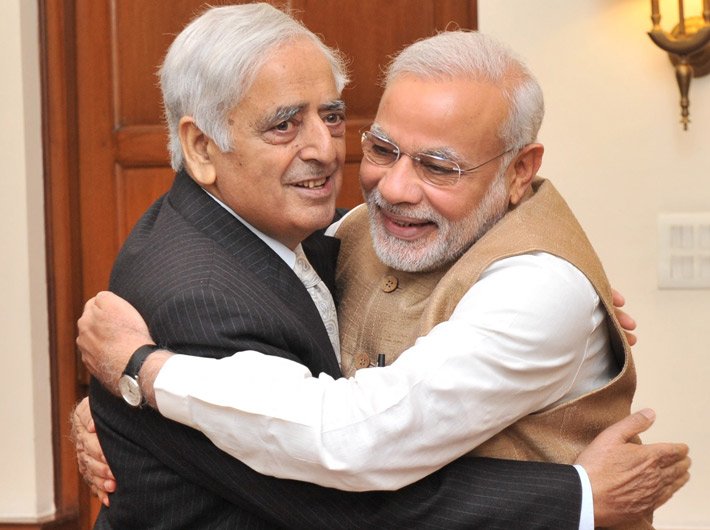His legacy of liberal values and political accommodation has brought Kashmir closer to the mainland. India’s only Muslim home minister, twice chief minister of J&K and more importantly a Kashmiri leader whose pragmatism made him join hands with a diametrically opposite force – BJP – for the sake of political stability and peace in the state: that is how Mufti Mohammad Sayeed will be remembered by historians.
Mufti’s life as a Kashmiri politician has been a saga of peaks and troughs; swinging from utter hopelessness to a sudden lucky patch that saw him taking up enviable positions at the centre and the state.
Amid all this, however, one thing that remained constant was his belief in India. This is in sharp contrast to scores of other leaders including the tallest of them, Sheikh Abdullah, who either put a price tag on their ‘Indianness’ or used it as leverage to grab power. Others often used a lot of ‘ifs’ and ‘buts’ on what should be seen an irrevocable affiliation of Kashmir with India (as against Pakistan) for short-term political gain and attention.
Honestly, Mufti the politician never showed any sparks of brilliance but made up for it with his handling of cadres, liberal outlook and excellent organisational skills. It is no wonder that he virtually built up the Congress party in Jammu and Kashmir against all odds after being handpicked by Indira Gandhi as the state Congress chief in 1975.
Although the Congress abdicated power to make way for the Sheikh in 1975, he never forgave the party for overthrowing and putting him in jail for 22 years on unproven charges of hatching an anti-India conspiracy. His National Conference treated the Congress activists with utter contempt. Sheikh Abdullah himself would call the Congressmen “worms of gutter”.
The NC later coined terms like “mufti whisky” to tarnish the Congress leader’s image in conservative Kashmir. The Congress in Kashmir particularly had to stay put with all this hate and propaganda.
However, Mufti kept boosting the morale of Congress cadres. The ruthless NC-wallas would threaten and taunt, saying Mufti should forget about winning an election; he will not even get land for his resting place in Kashmir. This was part of NC’s election discourse and sloganeering.
Mufti overcame this by winning his first assembly election from Ranbirsingh Pura, a largely Hindu constituency in 1985.
Mufti’s best phase as a politician came when he was made the country’s home minister by VP Singh, whosenew party he had joined in 1987. Also, it was during this period that he faced the biggest dilemma of his life – having to deal with the terrorists who had abducted his daughter,Rubaiya Sayeed, while she was on her way from hospital to home.
Soon he returned to the Congress in 1989. The Congress leadership in the state had passed on to another diehard nationalist Ghulam RasoolKar, with whom he did not share a good equation. He kept a low profile and people almost thought that his political career had come to an end.
As the Congress faced the challenge of contesting the assembly elections of 1996 which would put candidates in the firing range of armed militants whose deadly presence had led to mass exodus of politicians from Kashmir and created a political vacuum in the Valley, Mufti rose to the occasion. Like a soldier, he took up the challenge. As it was difficult to get candidates because of the fear of gun, Mufti made his wife Jahan Ara and daughter Mehbooba Mufti contest.
Mufti was soon to realise his dream of occupying the seat of J&K chief minister, thanks to Mehbooba Mufti, who charmed voters with her instinctive heart-to-heart talk. The Muftis became a potent alternative force in Kashmir and floated Peoples Democratic Party (PDP) which won the state elections in 2002.
Mufti remained a staunch advocate of improved Indo-Pak relations as he thought that this alone could bring a lasting peace in Kashmir. He avoided a direct confrontation with militants and their ideologues, leaving it for the armed forces to deal with them.
Mufti’s pragmatism and patience that saw him become chief minister of J&K twice will be sorely missed as the central government charts its Pakistan policy.

